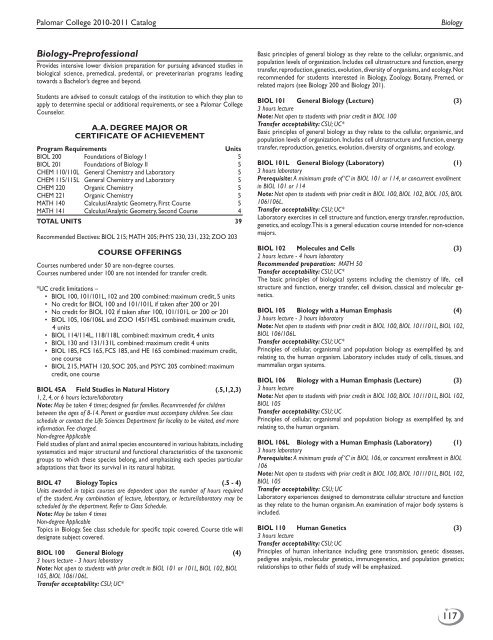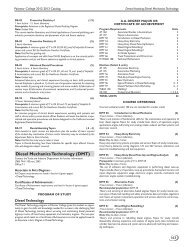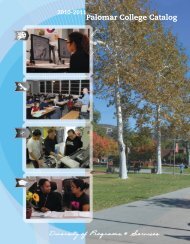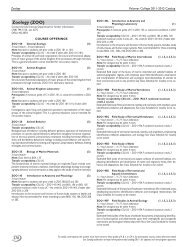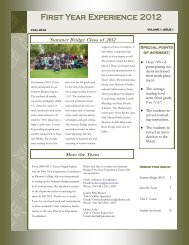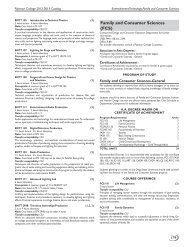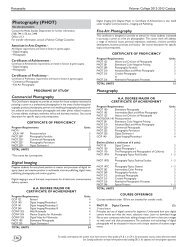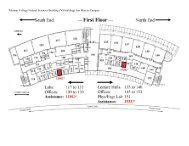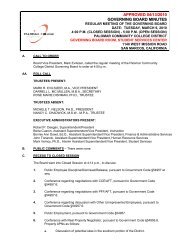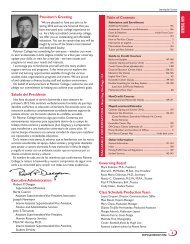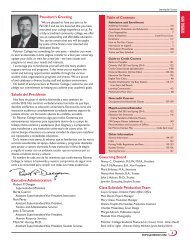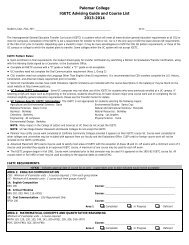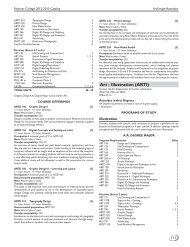Download the complete catalog - Palomar College
Download the complete catalog - Palomar College
Download the complete catalog - Palomar College
Create successful ePaper yourself
Turn your PDF publications into a flip-book with our unique Google optimized e-Paper software.
<strong>Palomar</strong> <strong>College</strong> 2010-2011 Catalog<br />
Biology<br />
Biology-Preprofessional<br />
Provides intensive lower division preparation for pursuing advanced studies in<br />
biological science, premedical, predental, or preveterinarian programs leading<br />
towards a Bachelor’s degree and beyond.<br />
Students are advised to consult <strong>catalog</strong>s of <strong>the</strong> institution to which <strong>the</strong>y plan to<br />
apply to determine special or additional requirements, or see a <strong>Palomar</strong> <strong>College</strong><br />
Counselor.<br />
A.A. Degree Major or<br />
Certificate of Achievement<br />
Program Requirements<br />
Units<br />
BIOL 200 Foundations of Biology I 5<br />
BIOL 201 Foundations of Biology II 5<br />
CHEM 110/110L General Chemistry and Laboratory 5<br />
CHEM 115/115L General Chemistry and Laboratory 5<br />
CHEM 220 Organic Chemistry 5<br />
CHEM 221 Organic Chemistry 5<br />
MATH 140 Calculus/Analytic Geometry, First Course 5<br />
MATH 141 Calculus/Analytic Geometry, Second Course 4<br />
TOTAL UNITS 39<br />
Recommended Electives: BIOL 215; MATH 205; PHYS 230, 231, 232; ZOO 203<br />
COURSE OFFERINGS<br />
Courses numbered under 50 are non-degree courses.<br />
Courses numbered under 100 are not intended for transfer credit.<br />
*UC credit limitations –<br />
• BIOL 100, 101/101L, 102 and 200 combined: maximum credit, 5 units<br />
• No credit for BIOL 100 and 101/101L if taken after 200 or 201<br />
• No credit for BIOL 102 if taken after 100, 101/101L or 200 or 201<br />
• BIOL 105, 106/106L and ZOO 145/145L combined: maximum credit,<br />
4 units<br />
• BIOL 114/114L, 118/118L combined: maximum credit, 4 units<br />
• BIOL 130 and 131/131L combined: maximum credit 4 units<br />
• BIOL 185, FCS 165, FCS 185, and HE 165 combined: maximum credit,<br />
one course<br />
• BIOL 215, MATH 120, SOC 205, and PSYC 205 combined: maximum<br />
credit, one course<br />
BIOL 45A Field Studies in Natural History (.5,1,2,3)<br />
1, 2, 4, or 6 hours lecture/laboratory<br />
Note: May be taken 4 times; designed for families. Recommended for children<br />
between <strong>the</strong> ages of 8-14. Parent or guardian must accompany children. See class<br />
schedule or contact <strong>the</strong> Life Sciences Department for locality to be visited, and more<br />
information. Fee charged.<br />
Non-degree Applicable<br />
Field studies of plant and animal species encountered in various habitats, including<br />
systematics and major structural and functional characteristics of <strong>the</strong> taxonomic<br />
groups to which <strong>the</strong>se species belong, and emphasizing each species particular<br />
adaptations that favor its survival in its natural habitat.<br />
BIOL 47 Biology Topics (.5 - 4)<br />
Units awarded in topics courses are dependent upon <strong>the</strong> number of hours required<br />
of <strong>the</strong> student. Any combination of lecture, laboratory, or lecture/laboratory may be<br />
scheduled by <strong>the</strong> department. Refer to Class Schedule.<br />
Note: May be taken 4 times<br />
Non-degree Applicable<br />
Topics in Biology. See class schedule for specific topic covered. Course title will<br />
designate subject covered.<br />
BIOL 100 General Biology (4)<br />
3 hours lecture - 3 hours laboratory<br />
Note: Not open to students with prior credit in BIOL 101 or 101L, BIOL 102, BIOL<br />
105, BIOL 106/106L.<br />
Transfer acceptability: CSU; UC*<br />
Basic principles of general biology as <strong>the</strong>y relate to <strong>the</strong> cellular, organismic, and<br />
population levels of organization. Includes cell ultrastructure and function, energy<br />
transfer, reproduction, genetics, evolution, diversity of organisms, and ecology. Not<br />
recommended for students interested in Biology, Zoology, Botany, Premed, or<br />
related majors (see Biology 200 and Biology 201).<br />
BIOL 101 General Biology (Lecture) (3)<br />
3 hours lecture<br />
Note: Not open to students with prior credit in BIOL 100<br />
Transfer acceptability: CSU; UC*<br />
Basic principles of general biology as <strong>the</strong>y relate to <strong>the</strong> cellular, organismic, and<br />
population levels of organization. Includes cell ultrastructure and function, energy<br />
transfer, reproduction, genetics, evolution, diversity of organisms, and ecology.<br />
BIOL 101L General Biology (Laboratory) (1)<br />
3 hours laboratory<br />
Prerequisite: A minimum grade of ‘C’ in BIOL 101 or 114, or concurrent enrollment<br />
in BIOL 101 or 114<br />
Note: Not open to students with prior credit in BIOL 100, BIOL 102, BIOL 105, BIOL<br />
106/106L.<br />
Transfer acceptability: CSU; UC*<br />
Laboratory exercises in cell structure and function, energy transfer, reproduction,<br />
genetics, and ecology. This is a general education course intended for non-science<br />
majors.<br />
BIOL 102 Molecules and Cells (3)<br />
2 hours lecture - 4 hours laboratory<br />
Recommended preparation: MATH 50<br />
Transfer acceptability: CSU; UC*<br />
The basic principles of biological systems including <strong>the</strong> chemistry of life, cell<br />
structure and function, energy transfer, cell division, classical and molecular genetics.<br />
BIOL 105 Biology with a Human Emphasis (4)<br />
3 hours lecture - 3 hours laboratory<br />
Note: Not open to students with prior credit in BIOL 100, BIOL 101/101L, BIOL 102,<br />
BIOL 106/106L.<br />
Transfer acceptability: CSU; UC*<br />
Principles of cellular, organismal and population biology as exemplified by, and<br />
relating to, <strong>the</strong> human organism. Laboratory includes study of cells, tissues, and<br />
mammalian organ systems.<br />
BIOL 106 Biology with a Human Emphasis (Lecture) (3)<br />
3 hours lecture<br />
Note: Not open to students with prior credit in BIOL 100, BIOL 101/101L, BIOL 102,<br />
BIOL 105<br />
Transfer acceptability: CSU; UC<br />
Principles of cellular, organismal and population biology as exemplified by, and<br />
relating to, <strong>the</strong> human organism.<br />
BIOL 106L Biology with a Human Emphasis (Laboratory) (1)<br />
3 hours laboratory<br />
Prerequisite: A minimum grade of ‘C’ in BIOL 106, or concurrent enrollment in BIOL<br />
106<br />
Note: Not open to students with prior credit in BIOL 100, BIOL 101/101L, BIOL 102,<br />
BIOL 105<br />
Transfer acceptability: CSU; UC<br />
Laboratory experiences designed to demonstrate cellular structure and function<br />
as <strong>the</strong>y relate to <strong>the</strong> human organism. An examination of major body systems is<br />
included.<br />
BIOL 110 Human Genetics (3)<br />
3 hours lecture<br />
Transfer acceptability: CSU; UC<br />
Principles of human inheritance including gene transmission, genetic diseases,<br />
pedigree analysis, molecular genetics, immunogenetics, and population genetics;<br />
relationships to o<strong>the</strong>r fields of study will be emphasized.<br />
117


